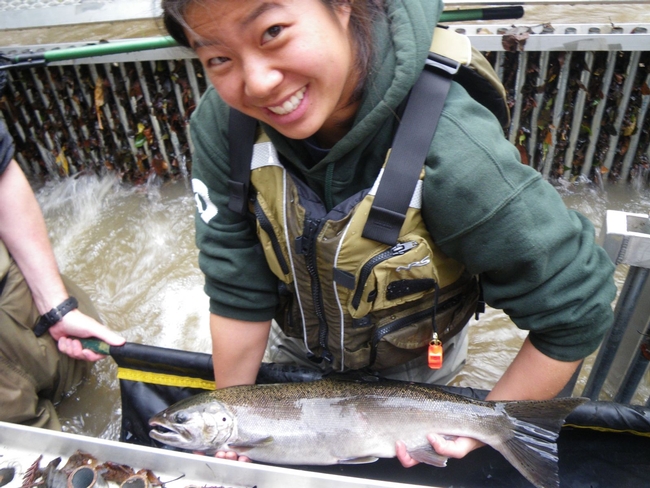Posts Tagged: Mariska Obedzinski
Salmon suffering because of scant rain
Coho salmon are still in the Russian River's main stem rather than in the tributaries where they are usually spawning this time of year because of this winter's lack of rain, wrote Bob Norbert in the Press Democrat.
Biologists are concerned about any harm done to coho, a fish which is being coaxed back from the brink of extinction but still numbers only in the hundreds.
“There is so much invested in bringing these coho back, from the hatchery program to the restoration work in Dry Creek to the monitoring,” said Mariska Obedzinski, who is monitoring the coho recovery program for the UC Cooperative Extension. “For someone to go out and accidentally catch one when they are in the river, when they could kill or harm them, it is discouraging.”
Corps of Engineers leads coalition effort to save coho salmon
JC Delgadillo, www.army.mil, The U.S. Army
In the winter of 2011, biologists funded by the U.S. Army Corps of Engineers counted a record number of wild juvenile coho salmon in the downstream portions of the Russian River system in western Sonoma County. The project is conducted in collaboration with NOAA's National Marine Fisheries Service, experts at the University of California Cooperative Extension and the Sonoma County Water Agency.
"It's quite the group we have working together," said supervisory fisheries biologist Ben White of the U.S. Army Corps of Engineers. "You've got the best scientific knowledge in the region and people with a deep passion for coho recovery. You've got leaders among their peers working this issue, and I'm proud to be a part of it. You wouldn't be in this field if you didn't care about these fish, and everybody involved wants to see them recover."
Scientists release wasps to control citrus pest
Jeff Spurrier, L.A. at Home blog, Los Angeles Times
On Jan. 6, UC Riverside bio-control specialist Mark Hoddle released 300 tiny parasitic wasps from Pakistan in the L.A. County cities of Pico Rivera, Bell Gardens and South Gate to feed on the Asian citrus psyllid.
The article mentioned that curry leaf, an herb used in Indian cuisine, can be a host for the Asian citrus psyllid.
“If someone has curry leaf and are in the L.A. area, we’d be interested in looking at their plants and maybe using them for our parasite release,” Hoddle said.
The reality of extreme weather, Part 1
Lynne Friedmann, La Jolla Light
It’s not your imagination. Weather is becoming more “extreme,” leading to prolonged heat waves, heavier precipitation, severe flooding, more powerful hurricanes, and intense snowstorms.
Especially problematic is a trend toward long heat waves, during which morality increases, and more humid heat waves resulting in higher nighttime temperatures.
Evening “chill hours” in which the temperature drops below 450º F are also critical for agriculture.
“There are three million acres of fruit orchards with chilling requirements,” said Louise Jackson, UC Cooperative Extension plant physiology specialist. “Increasing humid heat also impacts red wine grape yields.”


